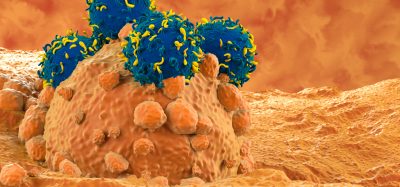Novel tool can estimate number of T cells in cancer tumours
Posted: 10 September 2021 | Anna Begley (Drug Target Review) | No comments yet
Researchers have developed a new method that can rapidly count the number of T cells in a tumour, helping to predict patient response to therapies.


A team at University College London (UCL) and the Francis Crick Institute, both UK, have created a new tool that can rapidly estimate the number of T cells in a cancerous tumour. Since T cell abundance can help predict a patient’s response to immunotherapy, the researchers are hopeful this could enable more targeted and effective cancer therapies.
“DNA sequencing is frequently performed on cancer patient’s tumours for patient stratification and to understand how a cancer has developed,” explained corresponding author Dr Nicholas McGranahan. “Estimation of immune cells, which are important for controlling cancers, influencing patient survival and guiding treatment, has in the past not been possible to estimate solely from DNA sequencing data. We aimed to explore whether we could develop a novel method to elucidate immune cells directly from DNA sequencing, without the need for more data.”
The researchers developed a tool to ‘look back’ and calculate levels of T cell ‘VDJ recombination’, wherein T cells in which they are reassembled or altered and given the tools, allowing them to identify and attack invaders.
Biomarkers are redefining how precision therapies are discovered, validated and delivered.
This exclusive expert-led report reveals how leading teams are using biomarker science to drive faster insights, cleaner data and more targeted treatments – from discovery to diagnostics.
Inside the report:
- How leading organisations are reshaping strategy with biomarker-led approaches
- Better tools for real-time decision-making – turning complex data into faster insights
- Global standardisation and assay sensitivity – what it takes to scale across networks
Discover how biomarker science is addressing the biggest hurdles in drug discovery, translational research and precision medicine – access your free copy today
Specifically, they found a ‘signal’ that indicated the loss of T cell receptor excision circles (TRECs), needed for T-cell maturation which occurred during VDJ recombination. By giving this ‘loss’ a score, they were able to estimate accurately the number of T cells present in the tumour.
“We show that this score can be used to predict response to immunotherapy and immune evasion mechanisms,” added McGranahan. “The score can also be applied to DNA sequencing data derived from normal blood samples that are typically collected but until now have not been able to be systematically analysed for immune content.”
The team hope that their tool will advance immunotherapy in the future. In recent years checkpoint inhibitors (CPIs) have emerged as a revolutionary treatment for many cancer types and one of the biomarkers found which predict the likely success of immunotherapy is the quantity of T cells present. The more T cells available for CPIs to adapt, the more cancer cells can be destroyed.
“Quantifying T-cell infiltration directly from DNA sequencing provides greater predictive power of patient response to treatment without the need for additional data,” stated first author Dr Robert Bentham. “Indeed, the process we have developed can be done without additional time or cost, beyond standard DNA sequencing. Our tool will also enable more research into the immune system, not only in the context of cancer.”
The study was published in Nature.
Related topics
DNA, Drug Targets, Immuno-oncology, Immunotherapy, Oncology, Personalised Medicine, Precision Medicine, T cells, Targets
Related conditions
Cancer
Related organisations
The Francis Crick Institute, University College London (UCL)
Related people
Dr Nicholas McGranahan, Dr Robert Bentham








